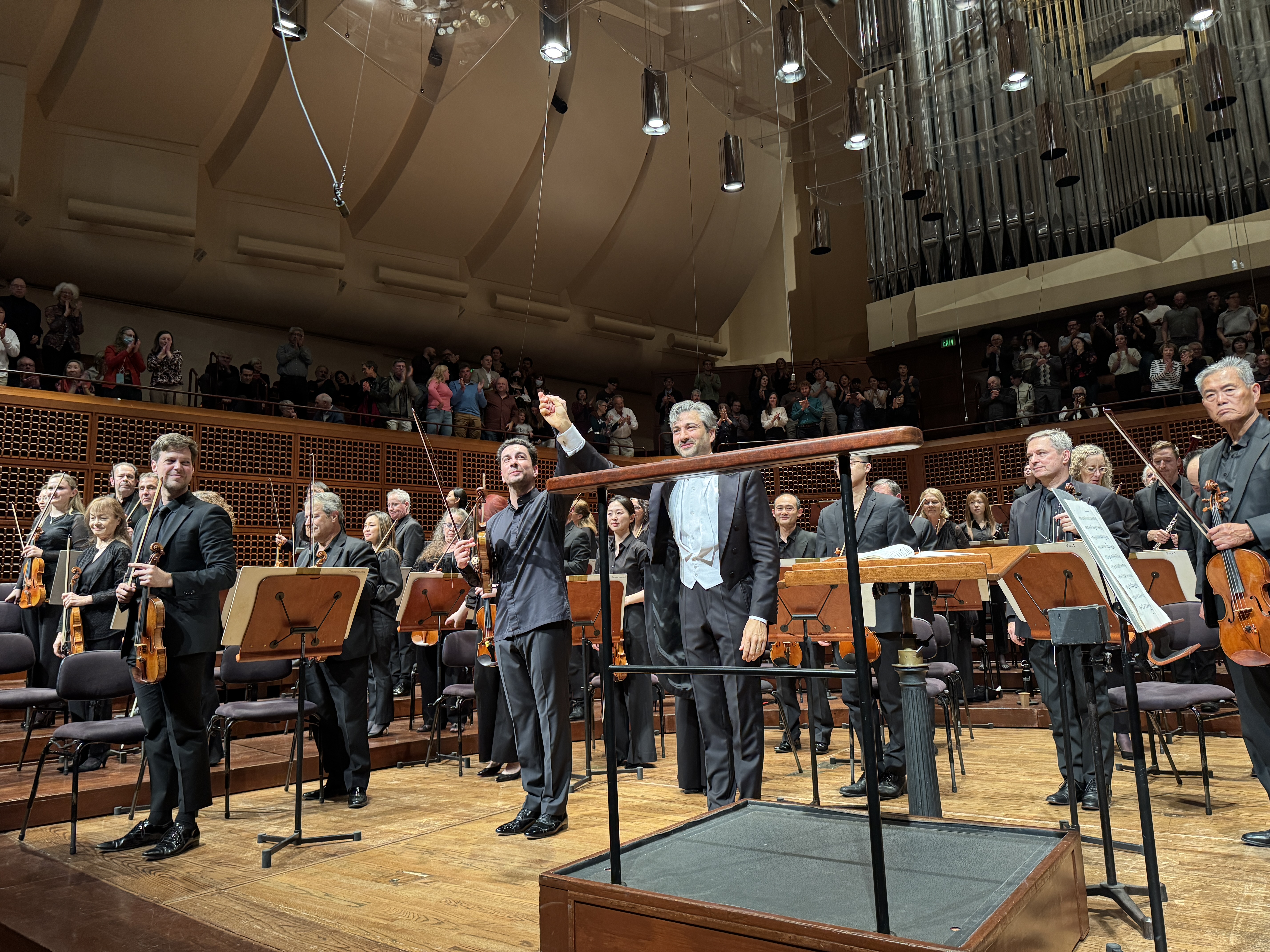Sergey Khachatryan Plays Tchaikovsky
October 25 2025Sergey Khachatryan has always been a favorite of mine, and I gushed about him after we saw him play the Sibelius back in 2020. This time we got front row seats to see him play the Tchaikovsky Violin Concerto, with David Afkham conducting. The weighty Shostakovich Symphony No. 8 closed the concert.
Among the top tier of violinists, I find that Khachatryan has absolutely the most beautiful vibrato and singing quality. That obviously is a great match for the Tchaikovsky, and I wasn’t disappointed. Sitting so close, we could hear all crunchy sound from the bow, but we still got plenty of the gorgeous singing and lyrical playing from him. One thing he did much more tonight was to have fun and play outside the bounds of the normal interpretation of the piece. He played with the tempo a lot, and the SFS followed him dutifully. I’m about to perform a piece in the next few weeks, and seeing Khachatryan live inspired me to play a little more, with my speed, phrasing, breathing, and general interpretation.
I do feel like his technique has degraded a little bit in the last few years. He struggled with intonation and some of the more difficult runs. There were also a few places where a top tier soloist would race through a run at top speed, and he tended to take them at much more modest and manageable tempi. I don’t think I had seen a live performance of Tchaikovsky in a while, so I was reminded of just how grueling it is for the soloist. They play uninterrupted for very long sections at a time. He definitely looked tired by the end of the piece.
For the encore, he started by having some small banter with the concertmaster (Jason Issokson), who said something like “I memorized it” and “I’m ready”. It was a little hard to make out, and it definitely wasn’t for the purpose of the audience. Then, he and the concertmaster started playing the encore. Khachatryan didn’t announce the song, but it sounded clearly like something from his native Armenia. The SFCV called it “an improvisation on a traditional Armenian tune”. It was hauntingly beautiful. The concertmaster basically just held one note (the lowest C natural on the G string), and Khachatryan played a tune that seemed to snake lovingly around that C natural (and of course, both starting and ending on that note). So, in hindsight, the “I memorized it” line was in jest.

The second half was just the Shostakovich Symphony No. 8. This was a rather weird program, as there were just two pieces, whereas usually there would be some type of overture or short orchestral piece as an opener. This concert also started at 7:30 pm, instead of the usual 8:00 pm. The reason is the Shostakovich, which is a long and heavy piece (running easily more than 1 hour).
Prior to starting, Afkham said a few words about the symphony. It was mostly a warning, telling us that the piece had a lot of pain and anguish, and although there is humor in the piece, it is very deeply dark and ironic humor. He also explained that the piece is in C minor and ends in C major, which is the typical hero’s journey that many composers followed after Beethoven’s fifth. But that although this piece ends in C major, it does not have the same resolution as other pieces that go through the same journey.
I have to admit - I was pretty unfamiliar with the piece. I tried listening to it a few times in ancipation of this concert, but I never was able to make it all the way through. Sitting in the audience, I can see why the piece had a tough reception from the Soviet audience (and especially Stalin and the other Soviet leaders) at the time of the piece’s premiere. It is long, uncompromising, and aggressively unbeautiful. It seems pretty certain that Shostakovich knew what he was doing, and he wrote this piece deliberately to spell out some of his feelings on the war. But as a pure piece of music, it is a rough listen.
The piece is long and meandering. There is seemingly very little structure, and even little in the way of motifs. The second and third movements are two aggressive marches that both sound similar, and are both somehow evoking the same types of despair and dark humor. The fourth movement is a slow movement that seems to lose any semblance of momentum that the marches established, and the last movement is a chorale that again meanders all over the place. Near the very end, there is a very exposed violin solo, which is then joined by a cellos solo. The solos sound like they were written for a totally different piece. They are different in character, tone, key, and situation. And after those solos, the piece quickly turns to C major, and ends within about a minute of that key change. So it is technically correct that the piece goes from C minor to C major. But keep in mind this is a 60+ minute symphony, and 59 of those minutes are in a bleak and depressive minor key.
I’m glad to have listened through and experienced the symphony. It was clearly what Shostakovich meant to communicate at that time. But I very much doubt that I will be returning tot his piece any time soon.
comments powered by Disqus